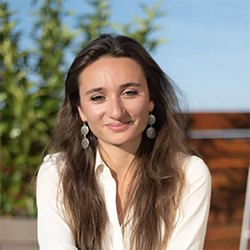The Role of Creativity in the Coaching Process
Creativity is defined as the ability to generate new ideas, solutions and possibilities. For the work to be considered creative, it needs to be both original and effective in achieving a specific purpose.
The International Coaching Federation (ICF) defines coaching as “partnering with clients in a thought-provoking and creative process that inspires them to maximize their personal and professional potential.” This implies that creativity plays a key role in client growth. But what is this role exactly, and how do we enhance the process?
If the field of coaching is to develop and gain wider acceptance, coaches need to better understand and research the factors responsible for helping clients.
Creativity and Client Growth
Research shows that behaving creatively is associated with increased positive emotions, decreased stress and depressive symptoms, and even an improved immune system.
Some professionals believe that the rise in global mental health issues is linked to losing touch with our innate creativity and its benefits. More specifically, the emphasis placed on productivity leaves no space for moments of reflection and innovation. Our society’s tendency to promote conformity is yet another factor that has adversely affected how much we utilize our natural creativity in navigating the world.
From that perspective, coaching can be viewed as a partnership to help individuals reconnect with their long-lost creativity.
1. Creativity as a tool to break unhealthy patterns
Clients often hope to let go of unhealthy behaviors they have been stuck in for a while. But what makes those behaviors challenging to change? Most of the time, the client is not only immersed in the problematic behavior, but is also caught up in the thoughts and emotions associated with it. Thus, their unconscious mind is trapped within the self-fulfilling loop of negative thoughts, emotions and actions, leaving little possibility for change.
With the help of a coach, clients can embrace their creativity and envision a desired future state in which they’ve let go of their unwanted patterns. Consequently, they can start to feel more aligned with achievement. In other words, the unconscious mind viscerally believes that the change has already happened, which leads to the development of more self-serving thoughts and behaviors. This shift in the thought-emotion-behavior triad becomes the foundation for change, providing the motivation to move from where they currently are to where they want to be.
2. Creativity as a tool to identify alternative strategies for existing problems
Creativity allows clients to let go of existing thinking patterns and experiment with novel perspectives in order to develop new, more successful strategies for tackling obstacles. As Albert Einstein stated: “We cannot solve our problems with the same thinking we used when we created them.”
In a rapidly changing environment such as ours, adaptability by thinking differently is essential.
The Role of Coaches in the Creative Process
The science of coaching is based on the underlying assumption that while everyone has the internal resources they need to make desired changes, this potential is often untapped. A coach’s role is to help clients relinquish self-sabotaging patterns and access more creative states to make use of their potential. Here are a few ways to do that:
1. Establish psychological safety
It can be uncomfortable to share innovative ideas, perspectives and goals out of fear of judgment. To facilitate the process of accessing creativity, it is crucial to first establish a rapport of trust and safety through methods like asking open-ended and curious questions, encouraging them to imagine ideal states regardless of current circumstances, acknowledging strengths, or even by attending to nonverbal cues such as one’s tone or body language.
2. Guide clients into a state of mindfulness
Mindfulness is about “paying attention in a particular way: on purpose, in the present moment, and nonjudgmentally.” It has been found to help develop many of the skills that support greater creativity including decreased fear of judgment, better working memory, more empathy and open-mindedness, and the ability to respond instead of reacting impulsively to difficult situations.
Guiding your client into mindful states through meditations, relaxation exercises, or visualizations will help them foster the skills they need to enhance their creative abilities.
3. Tap into our creativity
In order to master the art of coaching and answer the question, “what will be most useful for my client at this particular moment?”, the coach needs to access their own creativity.
A competent coach is flexible and innovative in their approach, responding spontaneously to the client’s needs without any attachments to what “generally works.” In fact, coaches directly inspire their clients to push their boundaries solely by modeling this creative behavior.



Love this – it hits directly on what I have been feeling are my natural strengths and how I can use these creative strengths with ideas and tools to build resiliency with clients. Thank you for this article!
Without any doubts, goals play a global role in our life and they even help us move forward, fulfilling our potential. I can say that frequently it is really difficult for me to set them and strive for achieving them because I have a lack of motivation and clear understanding of what I need. But articles such as yours inspire me to a huge extent and cause a desire to have a higher bar, boosting my ambitions. Also, I fell in love with your way to formulate your goals and it is so cool that you revealed each of them. It is so cool that you feel such energy and Inner aspiration to not be limited by a small quantity of aims and implement them. I also want to delve into generative art because I think that it is a unique field which will be more and more popular.